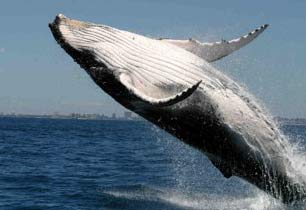Whale Vocabulary More Elaborate Than Thought

Humpback whales possess a vastly more elaborate vocabulary than was known, researchers now report.
Scientists had previously known of a very narrow range of sounds involved in humpback communication. These include calls associated with hunting for fish and long complex songs from male humpbacks linked with mating.
To investigate the whales further, researcher Rebecca Dunlop at the University of Queensland in Australia and colleagues monitored humpback sounds and activity from land as the whales migrated along the east coast of Australia from breeding grounds inside the Great Barrier Reef to feeding grounds in the Antarctic.
"The most surprising thing was there were 35 different types of sounds found. We were expecting less than 10," Dunlop told LiveScience.
Underwater sounds detected included "thwops," "wops," "grumbles," "snorts," "cries," and what are likely underwater blows. Sounds produced at the surface include those generated via breaching [image] or repeated slaps of the tail or fins.
The scientists discovered these sounds appeared to have a variety of social uses including to help mothers and calves stay in contact, or as competitive calls among large groups of adults. The whale calls might also be be specific to one sex.
At times humpbacks used sounds specific to male songs for social interactions, mainly when single males joined females. This could mean the song units are the key sexual signals in the male songs [audio], as opposed to song length or loudness, as is the case in some bird species, the researchers said.
Get the world’s most fascinating discoveries delivered straight to your inbox.
Research earlier this year found humpback whales to use grammar in their love songs.
Interestingly, the new study found that a number of sounds were made by lone animals. This suggests their use is not limited to social interactions.
This research could help understand the impact noise from ships and other manmade sounds have on whales. This noise "is increasing in the ocean," Dunlop said. "We don't know how this will affect individuals and populations of whales without first knowing how they communicate in a relatively 'noise-free' environment."
The researchers will report their findings Dec. 1 in Honolulu at a joint meeting of the Acoustical Society of America and the Acoustical Society of Japan.
- Images: The World's Biggest Beasts
- Ship Noise Drowns Out Whale Talk, a Threat to Mating
- Grammar Revealed in the Love Songs of Whales
- Whales Found to Speak in Dialects
- All About Whales



